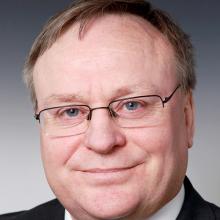Scientists striving to improve New Zealand's human and animal health are among University of Otago researchers who have gained $38.5 million in grants from the Government's Endeavour Fund.
The funding will enable researchers to tackle big issues ranging from climate change to antimicrobial resistance.

And a further nine ''Smart Ideas'' projects that catalyse and test promising innovative research ideas with high potential for benefits have received $9 million.
Research, Science and Innovation Minister Megan Woods announced this morning that the Government was investing $241 million in 71 research projects to tackle long-term issues like increasing sources of renewable energy, growing knowledge-intensive industries and tackling New Zealand's social issues.
Dean of the School of Biomedical Sciences, Prof Vernon Ward, is leading the 'New Frontiers in Antiviral Development' project, awarded $13,525.451 over five years to develop antiviral agents.
Prof Ward said there was a global burden and impact from viral disease and his team had discovered lead compounds that target new aspects of viruses not targeted previously.
''This project is very exciting as it brings a wide range of researchers together including virologists, cellular and molecular biologists, medicial chemists and industry partners,''Prof Ward said.
Together with other national collaborators from Victoria University, the University of Auckland, ESR, GlycoSyn and international partners, the Albert Einstein College of Medicine (US) and the University of Southampton (UK), the team will look to develop new classes of antivirals.
''By working together we will be able to develop these new agents and targets for treatment of viral diseases,'' he said.
Prof Merata Kawharu (Ngati Whatua, Ngapuhi) from the Centre of Sustainability, has been awarded $7,248,016 over five years for an initiative aimed at empowering Māori communities to respond to climate change.
This innovative research pioneers the development of marae-based and marae-led platforms and processes to help reduce carbon emissions in the community.
Prof Kawharu said the project will enable Maori communities to identify the issues and build from a community and culture values perspective to find solutions that help to lower carbon emissions that are cost-effective and help to restore the health of landscapes and communities.
''For example, we may build on successful projects like zero waste marae and look to greenhouse gas mitigation at ancestral landscape levels, considering alternative non-synthetic fertiliser and other non-intensified farm practices; then looking at household energy options that are cost-effective and also asking what local energy sources can be harnessed long term.''
Amid a perfect storm brewing internationally around the use of antibiotics in animals, microbiologist Profr Greg Cook, and Research fellow Dr Scott Ferguson, were leading a research project aiming to develop new antimicrobials.
By 2022, the European Parliament will ban the use of antibiotics important for human medicine in animals.
Prof Cook said that as antimicrobial resistance continued to rise and antimicrobial demand grows, the agricultural sector was faced with the perfect storm - needing to keep animals healthy despite challenges of ever-increasing production and intensification, yet having fewer antimicrobial agents available.
The project, which receives $8,709,022 over five years, aims to develop novel precision antimicrobials, which are narrow spectrum, killing the target pathogen without any harm to animals or good bacteria.
''We want to fundamentally transform the way animal infections are treated around the world, with innovative, first in class technology, with the aim of creating a New Zealand-based animal therapeutic research and development sector that employs people with a wide variety of skills and expertise to bring products to market,'' he said.
Otago University research leader Prof Richard Blaikie was ''exceptionally pleased'' to see these results in the largest national contestable research fund.
''Endeavour Fund research needs to be both transformative and highly connected to end users, which are both attributes we value strongly at Otago.''
''The strength of kaupapa Maori research at Otago is also evident in these results, with a programme focused on climate change adaption and projects looking at marine-environment remediation both intimately engaged with the hapu and iwi that have the most to gain from the research,'' he said.
Successful Smart Ideas projects:
• 'Diagnosis by light: An endoscopic probe for biopsy-free diagnosis of gastrointestinal diseases' - Dr Sara Miller, chemistry department, $999,999, 3 years
• 'Cultivating resilient marine forests to rebuild productive coastal ecosystems' - Associate Prof Chris Hepburn, marine science, $999,999, 3 years
• 'Enabling possum fertility control and eradication' - Dr Tim Hore, anatomy, $999,969, 3 years
•' Modelling the cracks, chills and feedbacks that will control Auckland's next eruption' - Prof James White, geology, $999,999, 3 years
• 'Generating non-heading ryegrass' - Associate Prof Richard Macknight, biochemistry,$999,999, 3 years
• 'Computational platform for phylogenetic analysis of somatic evolution' - Dr Alex Gavryushkin, computer science, $999,999, 3 years
• 'Phage-inspired custom antimicrobials to target bacterial pathogens' - Associate Prof Peter Fineran, microbiology an immunology, 3 years
•'Quantifying environmental resources through high-resolution, automated, satellite mapping of landscape change' - Dr Pascal Sirguey, surveying, $999,999, 3 years
• 'Contact-free sensing of high voltages using a laser electrometer' - Dr Amita Deb, Department of Physics, $999,999, 3 years
- Staff reporter

